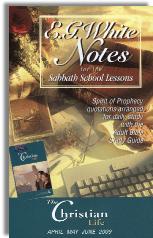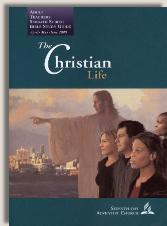|
||||||||||||||
Commentary on "Hope"
Day 4: Tuesday, April 14, 2009
There are two certainties that are dealt with in today’s lesson. Firstly, death is all around us as a constant reminder of our fragile mortality, and no man escapes it. Secondly, Christians take heart in knowing there will be a resurrection of the dead, and this is essential to our faith. Without the resurrection, as Paul said, we would be “most miserable,” and our hope is in vain.
How God accomplishes our resurrections is a mystery, the author states, but he doesn’t need to “safeguard the material substances of our bodies” to bring us back to life. After we die, he will preserve our identities within his divine memory and recreate us on resurrection day.
Problems
Paul made it clear that the Christian’s hope is in glorification by resurrection. We will not be satisfied with only life on this earth, or as a disembodied spirit. However, the lesson states that to resurrect us, God must safeguard our identities in his divine memory. This needs to be examined. There are a number of assumptions implied here:
- Human life is only material substance, a well-organized collection of chemicals and interactions. This includes our faith, our characters, and even our relationship with God. All we cherish is only chemical.
- At death, it all disintegrates, including our faith and characters, for our brains disintegrate. These are then preserved in God’s memory.
- At the resurrection, those patterns are recreated and implanted with our past memories, along with consciousness. This new being is then an enhanced version of what we were. “We” are a new creation.
A material resurrection of this kind is the creation of a duplicate. There is no actual “you” that is continuous or preserved alive. A clone cannot be “you” no matter how close it matches your genes or thinks like you. Most important of all, there is no scripture that states that at death, God preserves our identities in his memory and recreates us at the resurrection. This imposes a materialist philosophy on God’s word.
God’s word is more hopeful, for as Jesus said to Martha after Lazarus’ death, “Whoever believes in me, though he die, yet shall he live, and everyone who lives and believes in me shall never die” (Jn. 11:25, 26). Just as we learn we have assurance of salvation, we can also know that once we are given life, we will never lose it. “I give them eternal life, and they will never perish” (Jn. 10:28).
Jesus’ promise of eternal life becomes real when we realize he is speaking of the new, spiritual life he gives us through the Holy Spirit in the new birth. “That which is born of the flesh is flesh, and that which is born of the Spirit is spirit” (Jn. 3:6). The Spirit never leaves us ( Jn. 14:16). The Holy Spirit does not create some new kind of holy flesh, for the life of the new birth is spiritual life. With this new spiritual life in us, we can truly worship him, for “true worshippers will worship the Father in spirit and truth” (Jn. 4:23). Chemical interactions cannot worship God.
One of the most detailed passages about life after death is given in Philippians 1, where Paul speaks of his own dying. “My desire is to depart and be with Christ…But to remain in the flesh is more necessary on your account.” This would be an odd way to talk of resurrection, “to depart” and be with Christ, vs. remaining in the flesh (Phil. 1:23, 24). We know that at the resurrection, we will see Christ in our new bodies, so Paul is talking about being with Christ right after death.
This is supported by II Corinthians 5, where “we know that while we are at home in the body we are away from the Lord…we would rather be away from the body and at home with the Lord” (II Cor. 5:6,8). Paul is not celebrating the Platonic contempt for the material body, and hoping for a vapid, non-material existence in a spirit realm. To possess a body and spirit together is to be a whole person, for he longs to “be clothed” (II Cor. 5:4).
Summary
- The Study Guide assumes that because there will be bodily resurrection, our lives are therefore only physical entities without a non-material, spiritual component. Resurrection is then only a creation of a duplicate of us, and not a continuation of our real selves. Jesus promised that if we believe in him, we will never die, for the life he gives is eternal, and no one will take it away.
- The Holy Spirit gives us a living spirit which is not part of our fleshly body, and that is given eternal life. This is our real self which can love and worship God, who is a spirit. When we are resurrected, we will have a body which is a “spiritual body” like Christ’s body. We will still be “us,” because Jesus keeps his promises that we will never die. That is better by far than a duplicated, but well-behaved batch of chemicals.
Copyright 2008 BibleStudiesForAdventists.com. All rights reserved. Revised April 15, 2009. This website is published by Life Assurance Ministries, Glendale, Arizona, USA, the publisher of Proclamation! Magazine. Contact email: BibleStudiesForAdventists@gmail.com.
The Sabbath School Bible Study Guide and the corresponding E.G. White Notes are published by Pacific Press Publishing Association, which is owned and operated by the Seventh-day Adventist church. The current quarter's editions are pictured above.
Official Adventist Resources
Standard Edition Study Guide Week 3
Teacher's Edition Study Guide Week 3
Easy Reading Edition Study Guide Week 3
Search the Complete Published Ellen G. White Writings


